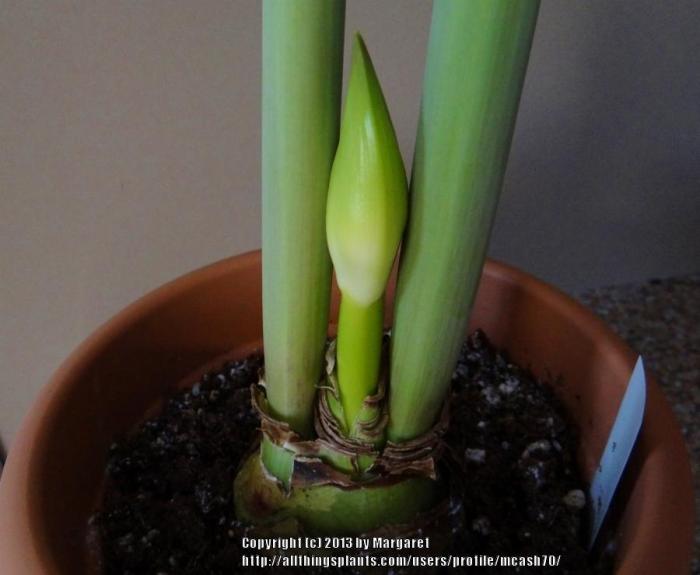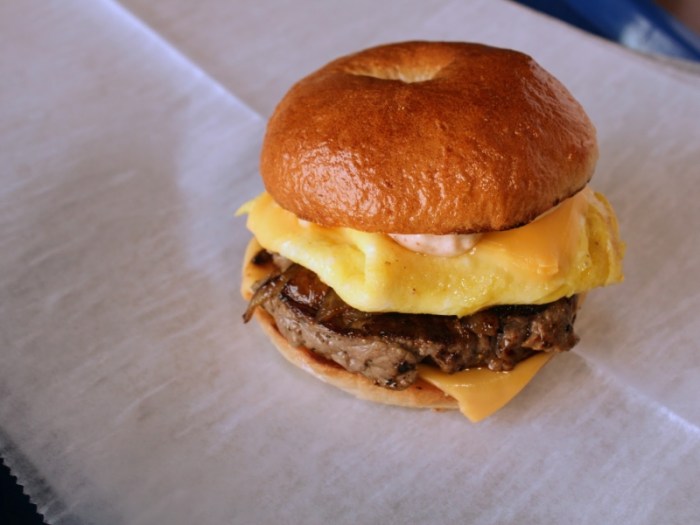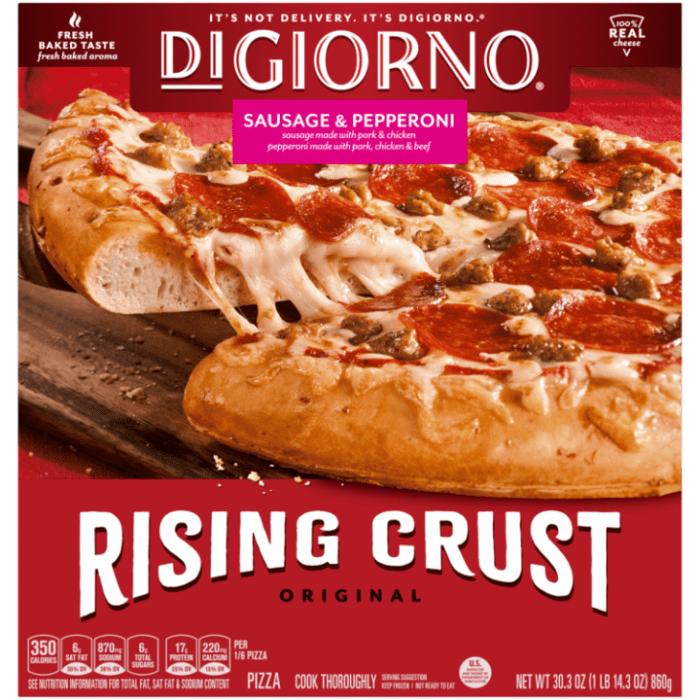Daiya Cheese Nutritional Composition
Daiya cheese nutrition info – Daiya cheese, a popular vegan cheese alternative, offers a compelling nutritional profile for those seeking plant-based options. Understanding its macronutrient and micronutrient content is crucial for making informed dietary choices. This section will provide a detailed examination of Daiya’s nutritional makeup across various flavors.
Macronutrient Breakdown in Daiya Cheese
The macronutrient composition of Daiya cheese varies slightly depending on the flavor. However, generally, it’s lower in fat and protein compared to traditional dairy cheese, while carbohydrates form a larger portion. The following table provides a general overview. Note that these values are approximate and may vary depending on the specific product and serving size. Always refer to the nutrition label on the packaging for the most accurate information.
| Cheese Type | Protein (grams per serving) | Fat (grams per serving) | Carbohydrates (grams per serving) |
|---|---|---|---|
| Cheddar | 5-7 | 8-10 | 10-12 |
| Mozzarella | 4-6 | 7-9 | 11-13 |
| Pepper Jack | 5-7 | 8-10 | 10-12 |
Micronutrient Content of Daiya Cheese
Daiya cheese, while primarily composed of macronutrients, also contains several micronutrients. These contribute to overall nutritional value, though the amounts vary depending on the flavor and processing. It’s important to remember that Daiya cheese is not a primary source of these nutrients, but rather a supplemental contributor to a balanced diet.
Daiya cheese, a popular vegan alternative, boasts lower saturated fat compared to many traditional cheeses. However, if you’re looking for a complete nutritional picture of a cheesy meal, comparing it to the calorie and fat content found in classic comfort food is useful; check out the nutrition facts of kraft mac and cheese for a stark contrast.
Then, you can better appreciate the lighter nutritional profile often associated with Daiya cheese in your meal planning.
Daiya cheese may contain:
- Vitamin B12: A crucial vitamin often lacking in vegan diets.
- Calcium: Important for bone health.
- Riboflavin (Vitamin B2): Contributes to energy metabolism.
- Various other vitamins and minerals in smaller amounts: The exact amounts depend on the specific flavor and manufacturing process. Always check the nutrition label for specific details.
Comparative Nutritional Analysis of Daiya Cheese Flavors
While the macronutrient profiles are relatively similar across Daiya cheese flavors, subtle differences exist. These differences may influence the overall nutritional impact when making dietary choices. The following table provides a simplified comparison; actual values may vary slightly depending on serving size and specific product.
| Cheese Type | Key Nutritional Differences |
|---|---|
| Cheddar | Generally higher in protein and fat compared to Mozzarella. |
| Mozzarella | Often slightly lower in protein and fat than Cheddar, with a potentially higher carbohydrate content. |
| Pepper Jack | Similar to Cheddar in protein and fat content, with potential variations in spice-related additives. |
Daiya Cheese vs. Traditional Cheese: Daiya Cheese Nutrition Info
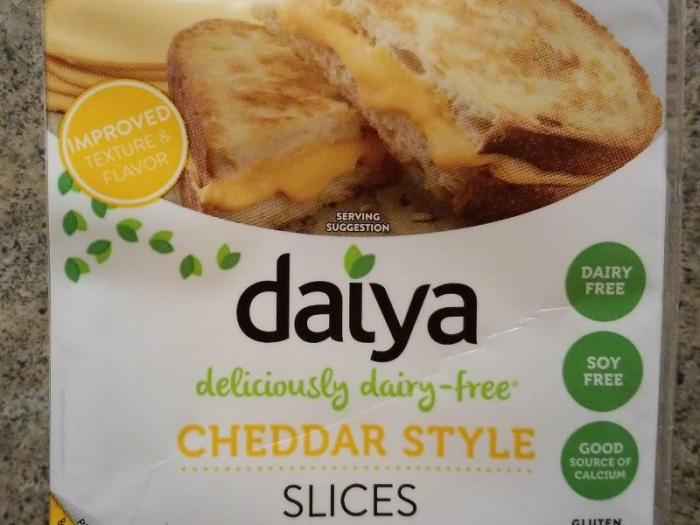
Let’s embark on a nutritional journey, comparing and contrasting the nutritional powerhouses that are Daiya cheese and traditional cheese varieties. Understanding these differences is key to making informed choices about your diet and overall well-being. We’ll dissect the nutritional profiles, explore the impact of processing, and empower you to make the best choices for your health.
Nutritional Comparison of Daiya and Traditional Cheeses
The following table presents a direct comparison of Daiya cheese against a typical cheddar cheese. Remember that nutritional values can vary slightly depending on the specific brand and type of cheese. This table provides a general overview to illustrate key differences.
| Nutrient | Daiya Cheese (per serving) | Cheddar Cheese (per serving) | Difference |
|---|---|---|---|
| Calories | 70-80 | 115-120 | Daiya significantly lower in calories |
| Total Fat | 6-8g | 9-11g | Daiya lower in total fat |
| Saturated Fat | 0-1g | 6-7g | Daiya drastically lower in saturated fat |
| Unsaturated Fat | 5-7g | 2-4g | Daiya higher in unsaturated fat |
| Protein | 2-3g | 7-8g | Cheddar significantly higher in protein |
| Sodium | 180-200mg | 170-200mg | Similar sodium content |
| Calcium | 10-15% DV | 20-25% DV | Cheddar higher in calcium |
Fat Content Differences: Saturated and Unsaturated Fats
A crucial distinction lies in the fat profiles. Traditional cheeses, like cheddar and mozzarella, are considerably higher in saturated fat, a type of fat associated with increased cholesterol levels. Daiya cheese, being a plant-based alternative, is significantly lower in saturated fat and contains a higher proportion of unsaturated fats, which are generally considered healthier fats. This difference stems directly from the source ingredients – dairy fat versus plant-based oils.
Consider the impact of choosing a lower saturated fat option on your overall cardiovascular health.
Impact of Processing Methods on Nutritional Value, Daiya cheese nutrition info
The processing methods used in producing Daiya cheese and traditional cheese dramatically affect their nutritional composition. Traditional cheese-making involves a natural fermentation process using bacterial cultures, resulting in a product rich in protein and certain vitamins. Daiya cheese, on the other hand, employs a different manufacturing process using plant-based ingredients and stabilizers to mimic the texture and flavor of traditional cheese.
This process results in a product lower in fat and calories, but often lower in protein and certain micronutrients found in traditional dairy cheeses. Understanding these differences allows for a more informed comparison and choice.
Daiya Cheese and Dietary Needs
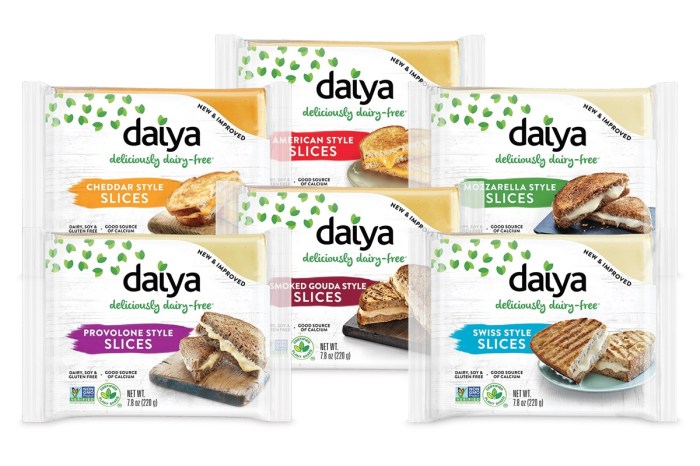
Daiya cheese offers a compelling alternative for individuals navigating various dietary restrictions and health concerns. Its unique formulation provides a dairy-free and vegan option, opening doors to a wider range of culinary possibilities while addressing specific nutritional needs. Let’s explore how Daiya cheese can fit into different dietary lifestyles and health considerations.Daiya cheese caters to a broad spectrum of dietary needs, primarily focusing on those seeking dairy-free and vegan options.
Its absence of dairy products makes it suitable for individuals with lactose intolerance, milk allergies, or those following a vegan lifestyle. However, its suitability extends beyond these primary categories, impacting individuals with specific health concerns as well.
Daiya Cheese and Specific Dietary Concerns
Daiya cheese presents both advantages and disadvantages for individuals with conditions like high cholesterol or high blood pressure. Careful consideration of its nutritional profile is crucial in making informed dietary choices.
- High Cholesterol: Daiya cheese is generally lower in saturated fat than many traditional cheeses, a factor that can be beneficial for individuals managing cholesterol levels. However, its sodium content should be carefully monitored, as excessive sodium intake can negatively impact cardiovascular health. Always check the nutrition label for specific sodium content per serving.
- High Blood Pressure: Similar to cholesterol management, the sodium content in Daiya cheese is a key consideration. Reducing sodium intake is vital for managing blood pressure, and choosing lower-sodium varieties of Daiya cheese is recommended. The absence of dairy fat can be advantageous, as saturated fats can contribute to high blood pressure.
Daiya Cheese Varieties and Dietary Suitability
The following table categorizes Daiya cheese varieties based on their suitability for various diets. Remember that individual needs vary, and consulting a healthcare professional or registered dietitian is always recommended before making significant dietary changes.
| Daiya Cheese Variety | Vegan | Dairy-Free | Lactose-Free | Low-Sodium | Low-Fat |
|---|---|---|---|---|---|
| Shredded Mozzarella Style | Yes | Yes | Yes | No (check specific product) | No (check specific product) |
| Slices | Yes | Yes | Yes | No (check specific product) | No (check specific product) |
| Cream Cheese Style | Yes | Yes | Yes | No (check specific product) | No (check specific product) |
| Other Varieties (e.g., cheddar, pepper jack) | Yes | Yes | Yes | Check Specific Product | Check Specific Product |
Essential FAQs
Is Daiya cheese a good source of protein?
While Daiya cheese provides some protein, it’s generally lower in protein compared to traditional cheeses. The amount varies depending on the variety.
Does Daiya cheese contain any cholesterol?
No, Daiya cheese is cholesterol-free, as it’s a plant-based product.
Are there any preservatives in Daiya cheese?
Daiya cheese contains preservatives; check the ingredient list on the specific product for details.
Can I freeze Daiya cheese?
Yes, Daiya cheese can be frozen, although the texture may change slightly upon thawing. It’s best to freeze it in portions for easy use.
How long does Daiya cheese last once opened?
Once opened, Daiya cheese should be refrigerated and consumed within the timeframe indicated on the package.




